
17M Act denounced evictions in Salvador’s Historic Centre during the pandemic
During the pandemic, the gentrification of parts of Salvador’s Historic Centre, which has been going on for years, did not encounter any obstacles. To denounce the evictions carried out during the health crisis, the Coalition for Salvador’s Historic Centre (Articulação do Centro Antigo de Salvador) held the 17M Act, which involved a day of mobilizations to extend the Supreme Federal Court (Supremo Tribunal Federal: STF) period for the suspension of evictions in the Action Against Non-Compliance with a Fundamental Precept (Ação de Descumprimento de Preceito Fundamental: ADPF 8280). In front of Salvador’s Legislative Assembly and in a march to the Bahia Court of Justice, the movement demanded an extension to the protective measures that suspended evictions during the pandemic up to March 2022. The mobilization received support from CESE through its Small Projects Programme.
Forced removals, which took place during the health crisis, aggravated the vulnerabilities of low-income families and directly affected the dignity of these social groups. According to Maura Cristina, member of the Coalition for Salvador’s Historic Centre, State Coordinator of the Homeless Movement of Bahia (Movimento Sem Teto da Bahia: MSTB) and representative of the Zero Evictions Campaign, “there was an increase in revenue in the tourism and property sectors, a continuation of the policy to value urban land and a weakening of social mobilization. As a result, we have seen an advance in the process to expel traditional families from the Historic Centre.”
One of the most symbolic cases of the public authorities’ lack of commitment to the right to housing and the preservation of family dignity was the 2021 authorization, by Salvador’s municipal authorities, of the eviction of families living in the neighbourhood of Tororó and the removal of the informal settlement in Fruto dos Sonhos, in the neighbourhood of Canabrava. In these very different areas of the city, families experienced uncertainty about whether they would have somewhere to shelter and socially isolate during the most critical moments of the pandemic.
According to Maura Cristina, in the capital of Bahia, an urban policy is being implemented that persecutes and expels the black population in order to meet the demands of the tourism and property markets, something that recently intensified under mayor ACM Neto, but which has existed since the 1990s. The movement points to certain initiatives that impact directly on residents of the Historical Centre and aim to gentrify its communities: the Revitalize (Revitalizar), Salvador 360 and Salvador 500 projects, the Comércio Neighbourhood Plan, the Sustainable Development Incentive Programme (Programa de Incentivo ao Desenvolvimento Sustentável: PIDI), the Urban Operations Consortium (Operações Urbanas Consorciadas: OUC) and the Special Zone of Social Interest (Zonas Especiais de Interesse Social: ZEIS) in Gamboa.
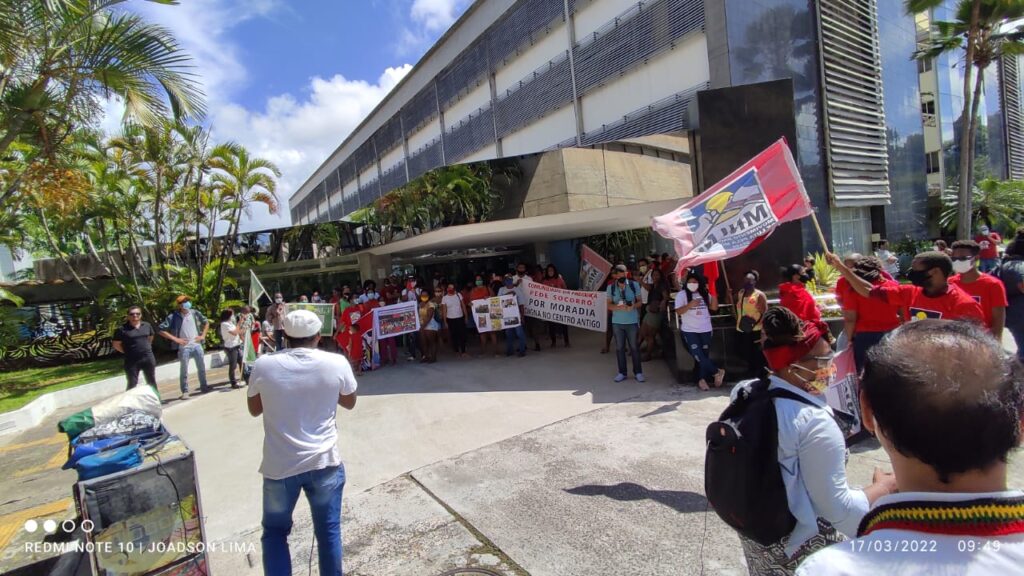
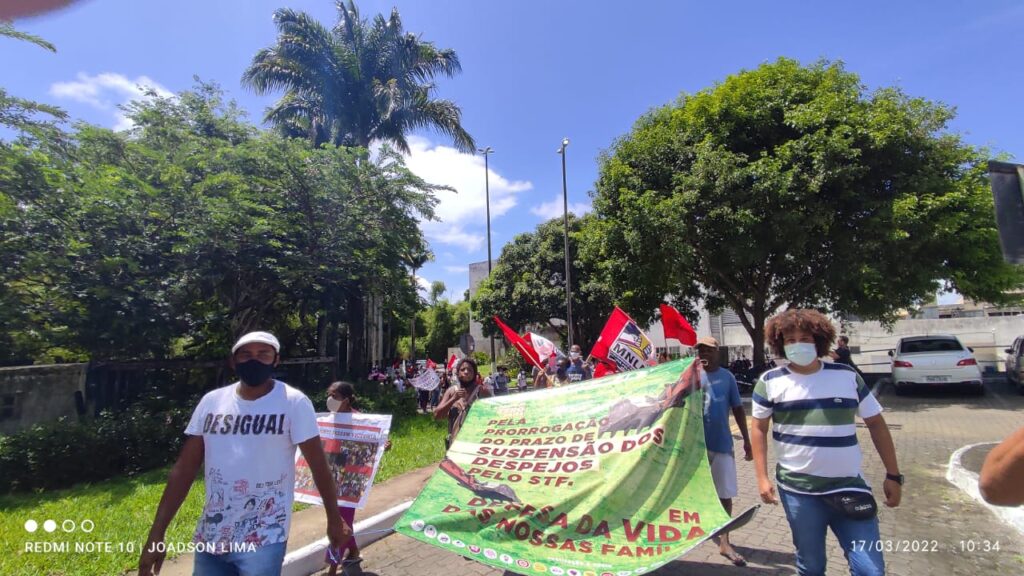
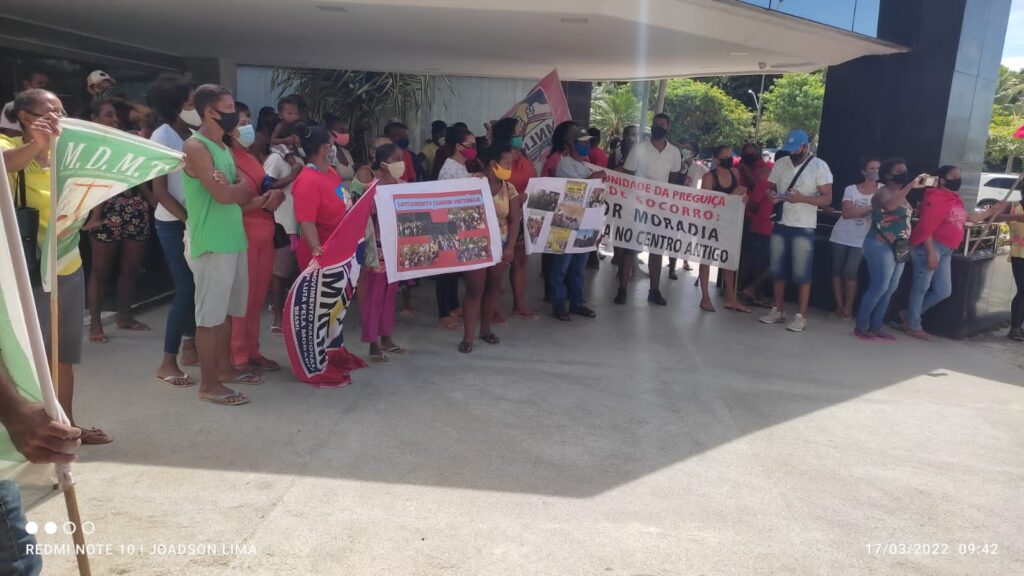
EXTENSION – the 17M Act was successful, mobilizing more than 20 local organizations and aligning itself with social movements in the fight for housing, nationally linked through the Zero Evictions Campaign, creating the pressure required to achieve the extension of the suspension period for evictions on 30 March 2022. STF Minister Luis Roberto Barroso extended the prohibition of evictions until June 2022 – the injunction guaranteed protection for more than 23 thousand Brazilian families, as estimated by the Zero Evictions Campaign.
In June 2022, new mobilizations demanded a further extension, which was then granted until October 2022, when the prohibition of evictions came to a definitive end. The STF decided to create a transition procedure, which led to the creation of a commission to mediate between and listen to the parties, before repossession could be determined for the owners.

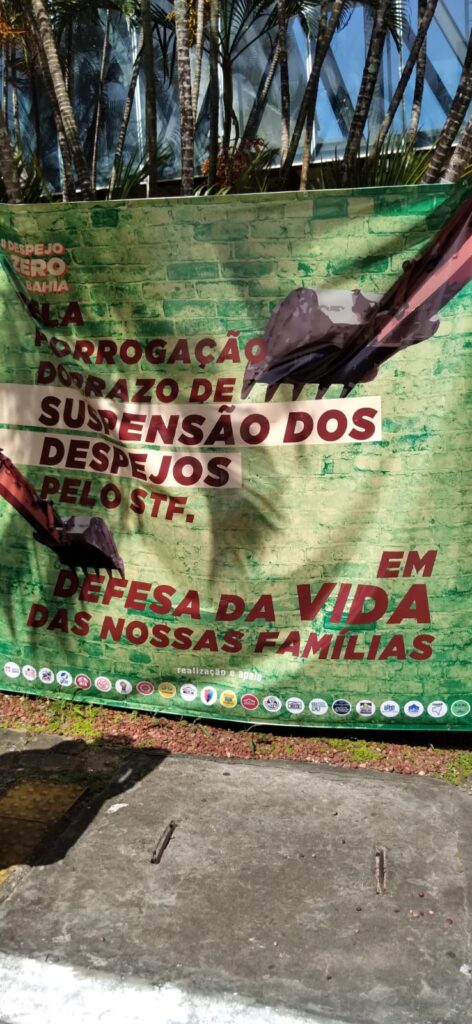
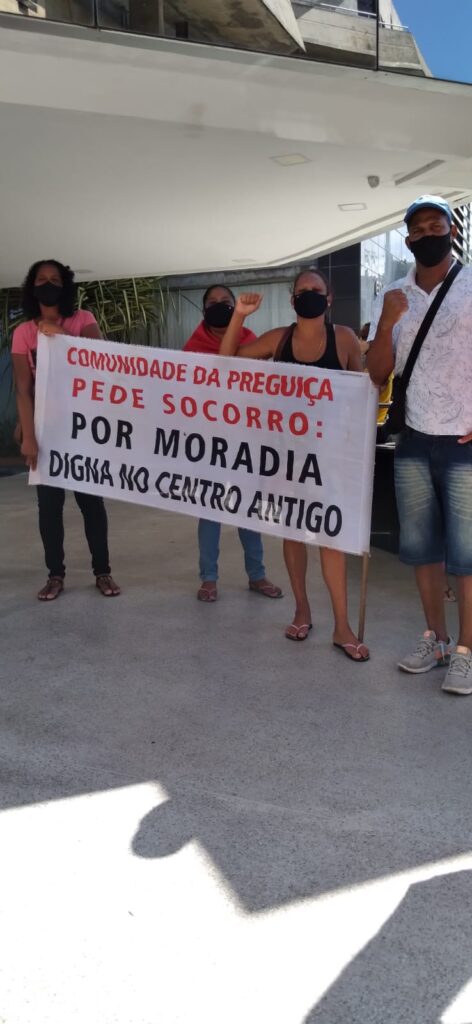
According to Maura, “the partnership with CESE helped to guarantee the participation of the Coalition for Salvador’s Historic Centre at a decisive moment of mobilization in favour of maintaining the Zero Evictions law, through logistical support to the social movements, which ensured transport, food, the production of graphic materials and so forth.” CESE has been involved in previous partnerships with the coalition, for example the Parade-Act cultural activity, which consists of an annual political mobilization that has been held since 2015, during the 02 July Bahia Independence Day commemorations.
Coalition for Salvador’s Historic Centre – Mobilization, communications, mobilizing political support and the defence of the right to housing. This is the context of the Coalition of Movements and Communities for Salvador’s Historic Centre, which is made up of the Friends of the Association of Residents and Friends of Gegê from Gamboa de Baixo (Associação dos Moradores e Amigos de Gegê da Gamboa de Baixo), the Our Neighbourhood is 2 de Julho Movement (Movimento Nosso Bairro é 2 de Julho), the Vila Coração de Maria Collective (Coletivo Vila Coração de Maria), the Cultural Centre What Hillside is This? (Centro Cultural Que Ladeira é Essa?), the Craftsmen of the Conceição da Praia Hillside (Artífices da Ladeira da Conceição da Praia) and the MSTB. The coalition involves groups on different trajectories over decades of struggle, who have joined forces to confront the permanent threats of expulsion from the Historic Centre of Salvador that have occurred in recent years.
The Coalition for Salvador’s Historic Centre works in monitoring, public oversight and mobilization against programmes, plans and public instruments for the Historic Centre that prioritize the private market, such as irregular demolitions/removals from the Preguiça, Montanha and Conceição Hillsides; threats of expulsion via state and municipal decrees for the purposes of expropriation, in particular in the 2 de Julho neighbourhood and on the Preguiça hillside; the struggles to remain of the Craftsmen of the Conceição da Praia Hillside Arches (Artífices dos Arcos da Ladeira da Conceição da Praia), who are threatened by public projects to “revitalize” the arches; to ensure land regulation for the traditional communities of Gamboa de Baixo; to suspend projects that have a socio-environmental impact, such as the expansion of the Bahia Marina on Preguiça Beach; to guarantee the right to housing for homeless families’ informal settlements in the region; and to preserve the Vila Coração de Maria as a housing and socio-cultural arena.
The movement’s work is based on discussions about the Right to the City, denouncing the authoritarianism of public interventions that favour the property market, without consultation and often involving violence by the public security forces. The coalition also proposes solutions to address the housing shortage and the precariousness of public policies aimed at residents remaining in, and thus the vitality of, the territory. Throughout 2022, the movement continued to fight, denouncing gentrification, combating evictions and for the defence of life, in integration with movements for the Right to the City around the country.

